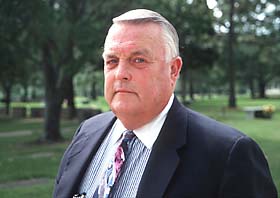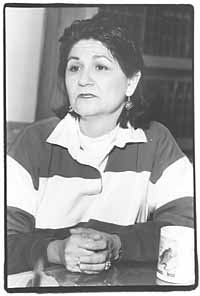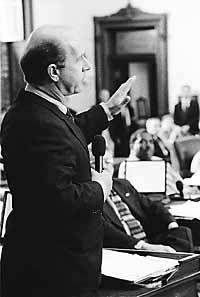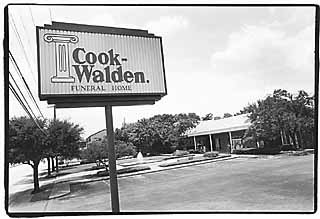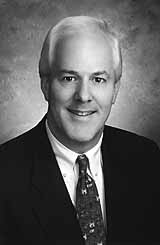Funeralgate Hits Texas
What Did Bush Know?
By Robert Bryce, Fri., July 9, 1999
Five days after issuing the document stating that Waltrip talked to the governor about the letter, Waltrip's lawyers changed their story. In a second, "supplemental" response to interrogatories, filed on June 16, the lawyers said that Waltrip did not talk to Bush about his problems with the TFSC. The supplemental document says that while Waltrip was in Bush's office waiting to talk with Joe Allbaugh, Bush's chief of staff, the governor "passed by on the way to a press conference or other appointment," and although Bush "exchanged pleasantries" with Waltrip, their discussion was "not substantive; they did not discuss the content" of Waltrip's letter complaining about the TFSC. The document adds that Waltrip "has never discussed" with Bush his complaints about the TFSC. Perhaps Waltrip or his lawyers realized that implicating the governor in the dispute would damage Bush's presidential campaign.
Whether Waltrip talked to Bush about his problems with the TFSC or not, the governor's office got the message that Waltrip wanted delivered. So did a half-dozen legislators. Within days of Waltrip's visit to Austin, the legislators, the governor's office, and others began applying pressure on SCI's behalf. Consider these facts:
- The day after Waltrip's visit to Bush's office, Rep. Kyle Janek, a Houston Republican who owns stock in SCI, called May, the TFSC's executive director, to ask her about her agency's investigation of SCI.
- Within the next week, four legislators -- each of whom got substantial campaign contributions from SCI's PAC, wrote nearly identical letters to the TFSC board chairman, Dick McNeil, inquiring about the investigation.
- Within a month, TFSC director May says, she was called into the office of Sen. John Whitmire, a Houston Democrat who has received more campaign money from SCI than has any other member of the Senate. There, May says, he "brow-beat" her about the SCI investigation and told her he was going to have another meeting to try to "put an end to the matter."
- A few days later, May alleges, she was called into Allbaugh's office where -- with Waltrip sitting in the same room -- Whitmire interrogated her about the TFSC's investigation into SCI and demanded that she answer his questions about the investigation.
- Within 10 months, May was fired by the TFSC. And within a year, SCI had hired a lobbyist who helped pass a bill through the Texas Legislature overhauling the TFSC and ousting board chair McNeil.
- Within 14 months of Waltrip's visit to Bush's office, Texas Attorney General John Cornyn, who got $2,000 in political contributions from SCI, had issued an opinion backing SCI in its dispute with the TFSC.
Perhaps all of these incidents are coincidental. Or perhaps they show how big money donors, through campaign contributions, buy influence at the highest levels of state government.
The Deadly Details
On the face of it, the underlying issues are simple. Waltrip wants state regulators to interpret the law in a way that allows SCI to continue making huge profits on its embalmings, even though its prices are already among the highest in the industry. At issue are regulations governing commercial embalming facilities. SCI contends that it may allow commercial embalming companies to operate inside its existing funeral homes, and that it doesn't have to tell its customers when it uses third-party contractors (see "Embalming for Dollars,").
The TFSC contends that state law prohibits such practice, and that SCI must notify consumers when it uses third-party contractors to do embalmings, including how much such services cost. Tens of millions of dollars in revenue are at stake, particularly for SCI, the biggest player in the Texas funeral business. The company owns about 150 of the 1,261 funeral homes in the state.
As a major player in the funeral business, SCI is accustomed to doling out cash in the form of perfectly legal campaign contributions. From 1996 through the 1998 election, SCI's PAC contributed about $113,000 to the campaigns of dozens of politicians. Bush received $35,000 from SCI. Cornyn got $2,000. Moreover, there appears to be a connection between SCI's political giving and actions taken by elected officials.
In Cornyn's case, his office reversed field 180 degrees in order to aid SCI.
|
|
In March, the opinion committee at the attorney general's office said it would not issue an opinion on the TFSC's investigation into SCI's embalming operations. But on June 2 -- just 26 days after meeting with SCI's lawyers -- Cornyn's office issued a 17-page opinion that appears to support SCI's position on the embalming regulations. In addition, documents obtained by the Chronicle under the Texas Public Information Act show that officials from Cornyn's office also met with SCI's lawyers in January to discuss the company's problems with the TFSC.
In addition to Bush and Cornyn, the other politicians who received political contributions between 1996 and 1998, and then wrote letters or interceded on SCI's behalf include:
- Whitmire, who got $5,000 from SCI's PAC.
- Janek, who owns between 1,000 and 5,000 shares of SCI stock worth at least $18,750, and got $4,355 in contributions from the SCI PAC.
- Former state Sen. Michael Galloway, a Republican from the Woodlands, who received $4,847.
- Sen. Ken Armbrister, a Victoria Democrat who got $1,500.
- Sen. John Carona, a Dallas Republican who got $500.
- The late Rep. Dan Kubiak, a Democrat from Rockdale, who got $500 from the SCI PAC.
Within days of the TFSC's unannounced April 10, 1998 visit to two of SCI's Dallas-area funeral homes, each of the six legislators had weighed in on SCI's behalf. Janek and Whitmire went to May; the other four wrote nearly identical letters to TFSC chairman McNeil. Each of the letters refers to a "formal complaint" -- presumably Waltrip's April 15, 1998 letter -- and they all urge McNeil to respond in a "prompt and decisive manner" and to "hold a hearing on this complaint" as soon as possible. More on the legislators in a moment.
Dismantling TFSC
The political pressure applied on SCI's behalf appears to have worked. After the letters were sent, and after May's meeting in the governor's office, the TFSC's investigation into SCI ground to a halt. The TFSC did not request any more documents from SCI, no more subpoenas were issued, and no more surprise investigations were done. And although the TFSC recommended last August that SCI be fined $445,000 for violating state embalming laws, the company hasn't yet been required to pay a dime.
Meanwhile, however, the TFSC -- the primary agency responsible for protecting Texas consumers from unscrupulous funeral practices -- has been disemboweled. May says that SCI's pressure led to her dismissal, a move that further weakened the tiny agency. The agency is authorized to have 10 employees. It currently has just five. Over the past five years, the TFSC has had five executive directors, and five general counsels over the past two and a half years.
On June 25, another employee, Michelle Dobbins, the employee with the longest tenure at the agency, quit. At present, the longest-serving employee at the TFSC has been there just two and a half years. Critics claim that weakening the TFSC benefits SCI because the company can operate with less oversight.
"They've dismantled the agency so that there's no one competent enough" to enforce the law, says one former TFSC staffer.
More changes are coming. As of Sept. 1, the agency will be reorganized. During the last legislative session, SCI hired a lobbyist to write, and then convinced legislators to pass, a bill that strips the agency of its general counsel and forces chairman McNeil to retire from the TFSC. The new law requires industry members to be licensed embalmers, a requirement that effectively forces McNeil off the board. It was McNeil who approved the investigation into SCI's embalming practices. Last fall, he said he wanted SCI "to understand that the law is to be applied to everybody equally. Everybody has to meet the same standards."
Mixed Messages
Clearly, the politico with the most to lose in Funeralgate is Bush. And he's staying as far from the scandal as he can. But so far, Waltrip has done the governor few favors. By issuing conflicting interrogatory answers, Waltrip appears to have impugned his own credibility as well as the governor's.
So which is it? Did Waltrip talk to Bush about SCI's complaints or not? Either way, the manner in which Bush's office handled this case does not bode well for the governor.
Two weeks ago, Johnnie B. Rogers, SCI's Austin-based lawyer, repeated the claim that Waltrip "never talked to the governor" about the TFSC investigation. Why, then, did SCI's in-house lawyer, Daniel Reat, swear that Waltrip talked to Bush? In a notarized court document, Reat said that the answers in the first interrogatory "are either within his personal knowledge or based on information obtained from other persons, and are true and correct."
And why did Allbaugh get involved? Did he, as Bush's chief of staff, simply make his own decision to intervene on behalf of SCI? Could Allbaugh have been persuaded by a $35,000 political contribution? Allbaugh, who left the governor's office on July 1 to work full time as campaign manager for Bush's presidential campaign, hasn't been deposed yet, but he will be soon. And he will be a key witness when May's case goes to trial, as will Bush's legal counsel, Margaret Wilson.
"Gov. Bush was not involved in this case and has no personal knowledge of the facts in this case," says his spokesperson, Linda Edwards. Perhaps that's the case. But why, then, is Bush fighting the deposition? Neither Edwards nor the AG's office have provided any legal reason why Bush should be allowed to duck the deposition. It is possible Bush will claim executive privilege -- a move that would certainly add intrigue to Bush's political aspirations.
Apart from Bush, the Cornyn connection to the case may be the stinkiest part of Funeralgate. By getting involved, the attorney general has implicated himself and one of his chief assistants, Andy Taylor, in a series of ethical questions. He has also raised serious questions about the influence exerted by Locke Liddell & Sapp, the law firm that represents SCI. Documents obtained by the Chronicle show that Taylor, who was a partner at Locke Liddell before going to work for Cornyn, initially wanted to avoid the SCI matter. On January 20 of this year, Taylor sent an e-mail to the AG's general counsel, Clark Ervin, asking Ervin to "screen" him "from SCI matters and please do not copy me on anything related to SCI." Taylor told Ervin he wanted to "comply with all of the ethics laws to the fullest."
|
|
But a memo obtained by the Chronicle under the Texas Public Information Act lists Taylor as attending a May 7 meeting between Cornyn and SCI's lawyers. In addition, Taylor's name is the first one listed after Cornyn's on the June 2 opinion concerning SCI and the TFSC.
Heather Browne, a spokesperson for Cornyn, said that despite the memo, Taylor did not attend the May 7 meeting. "It's a clerical error," she said. "He wasn't even in the building." With regard to the opinion, she said that Taylor's name appears on all of the AG's opinions, and that Taylor "completely recused himself on the SCI opinion."
Browne added, "The meeting and the opinion aren't necessarily related. In order to be a hands-on attorney general, he should be able to meet with people who request meetings with him. And that's what he did with the SCI representatives. There was no correlation between the meeting and the issuance of an opinion."
So who attended the May 7 meeting? Documents obtained under the Public Information Act show that SCI's general counsel, James Shelger, along with two Locke Liddell attorneys, co-managing partner Bruce LaBoon and James Essig, met with Cornyn. However, during an interview last week, SCI attorney Johnnie B. Rogers told the Chronicle that he, too, was at the meeting with Cornyn. Asked who else attended, Rogers replied, "Are you quoting me on this? If so, I am not telling you a thing."
Perhaps Rogers is confused. Documents show that on January 19, Rogers and two other SCI attorneys, Shelger and Daniel Reat, met with Clark Ervin at the AG's office, to, in Shelger's words, discuss "SCI's relationship with the Texas Funeral Service Commission."
In a January 28 letter, Shelger told Ervin that "SCI appreciates that the Office of the Attorney General has agreed to remain involved in the investigation and resolution of these issues and to ensure that they are handled appropriately."
That leads to the obvious question: Why did Cornyn decide in June to get involved in a dispute that was pending before a state agency? After all, Cornyn's office had made its position clear in a March 4 letter written by Elizabeth Robinson, the chair of the Attorney General's Opinion Committee.
Last year, Sen. Whitmire wrote the attorney general's office asking for an opinion on a series of questions relating to the TFSC and its authority to regulate embalming. In her letter responding to the request, Robinson said that the AG was not going to answer the questions because the TFSC was involved in a contested case with SCI and that "our understanding is that this controversy is set for mediation before the State Office of Administrative Hearings. "Given these circumstances," Robinson wrote, "it would not be appropriate for the Office of the Attorney General to interpose itself in this matter." And she added, "we respectfully decline to issue an opinion at this time and are closing our file on this matter."
One month later, on April 8, Cornyn sent Robinson a memo indicating his desire to get involved in the SCI case. Although he doesn't mention the case by name, Cornyn writes that he "would like to review all instances in which the Opinion Committee believes we should decline an opinion request." Cornyn then repeats his instructions, saying "ALL instances," and instructs Robinson that "at the very least, I want to be informed about these instances before the letter goes out."
Perhaps it's a coincidence, but the very next day after Cornyn sent this memo, which was also sent to Andy Taylor, Cornyn's office got a new request from Sen. Armbrister, which asked all of the same questions that Whitmire had asked in the initial request for an opinion, nearly a year earlier. Armbrister's letter asked the AG to rule on regulations governing commercial embalming establishments, third-party embalming, and other issues.
And once again, there's a case of nearly identical letters. Armbrister asked the exact same 11 questions that Whitmire had asked. In fact, Armbrister's letter is almost identical -- down to the period and comma -- to the one Whitmire had sent to Cornyn on June 15, 1998.
Compromising Positions
|
|
Given Armbrister's new request, Cornyn decided to issue an opinion. But by doing so, Cornyn put his office in an odd position and he may earn himself an appearance before the State Bar of Texas for misconduct. By siding with SCI in their dispute with the TFSC, Cornyn appears to have bowed to political pressure. And by issuing the opinion, he may help the agency in the whistleblower suit filed by May, by concurring that her complaints about SCI were unfounded. However, Cornyn may also have hurt the state in its dispute with SCI. That's because the TFSC's dispute with SCI has not been resolved, and the TFSC's fine against the company still hasn't been paid. Thus, Cornyn has taken a position that is adverse to his own client, the TFSC. And State Bar rules prohibit lawyers from taking actions that are adverse to their clients' interests.
|
|
May has asked the State Bar to investigate Cornyn's actions. Although the Bar's inquiries are kept secret unless and until it decides if a lawyer should be punished, the complaint could be nettlesome for Cornyn because May is represented by Charles Herring Jr., an Austin attorney who is well versed in legal ethics. In fact, Herring has authored a textbook called Texas Legal Malpractice and Lawyer Discipline.
And there's more to the Locke Liddell connection, as well. Whitmire is of counsel at Locke Liddell. And Whitmire may have done more than any other legislator to aid Waltrip's assault on the TFSC. It was Whitmire who demanded that May appear in Allbaugh's office to be interrogated in front of Waltrip regarding her agency's investigation. It was Whitmire who first asked the AG to get involved in the case. Perhaps it's coincidence, but Whitmire's district contains the Heights, where Waltrip's first funeral home is located. And maybe the $5,000 that SCI has given to Whitmire didn't influence his actions.
In March, Whitmire told the Chronicle he got involved after SCI contacted him, "because I was concerned about the press and the activities of the commission with constituents of mine." He added that he was trying to be a mediator in the dispute between SCI and the TFSC. But Whitmire stumbled when asked about the TFSC's investigation into SCI. He initially said, "I don't know much about what investigation you are talking about. We were not dealing with the investigation." But he later contradicted his claim of ignorance about the TFSC's investigation, when he said he knew about the April 10, Good Friday, visit to the two SCI funeral homes. "I don't think you ought to be making Good Friday raids at seven o'clock in the morning and intimidating citizens of Texas," he said.
While Whitmire went out of his way to help SCI, he is doing all he can to avoid testifying about his role in the scandal. In a June 30 motion for a protective order issued by the attorney general's office, which is representing Whitmire, assistant attorney general Dona G. Hamilton argues that Whitmire doesn't have to disclose any of the discussions he held with SCI about the TFSC investigation because such communications are protected by law. The law, known as legislative privilege, says that public disclosure of communications from "a citizen of this state received by a member [of the Legislature] or the lieutenant governor in his official capacity is prohibited."
However, the statute goes on to say that an official may disclose the information if he "determines that the disclosure does not constitute an unwarranted invasion of personal privacy of the communicator."
Would SCI and Waltrip have their privacy violated if Whitmire agreed to disclose the details of his conversations with them? Or would it just be embarrassing, to them and perhaps others? If Whitmire's effort to quash the subpoena succeeds, citizens will never be given a chance to find out.
What is most ironic about Cornyn's position in Funeralgate is that he ran against, and beat, Jim Mattox by attacking Mattox on ethics issues. Cornyn ran TV ads slamming Mattox for associating with Dallas businessman Danny Faulkner, who was later convicted of fraud. But now Cornyn appears to be actively siding with the world's largest funeral home after he took a campaign contribution from them. In addition, it appears that he's taking that position even though it may harm consumers. And by allowing his first assistant, a lawyer formerly tied to SCI's law firm, to appear to be involved in the case, Cornyn raises questions not only about his ethics, but about his judgment.
Buying Power?
|
|
There may be no way to prove that the six legislators named above did anything illegal when they tried to help SCI in its battle with the TFSC. But the actions of Rep. Kyle Janek are the ones most likely to raise eyebrows. According to a disclosure statement filed with the Ethics Commission, Janek, a physician, owns SCI stock worth a minimum of $18,750 (based on stock prices as of June 25). On April 23, 1998, he wrote a letter to Eliza May asking questions about the TFSC's investigation into SCI's operations. Twenty-two days later, Janek got a check from SCI PAC for a $1,000 campaign contribution. Then, a week later, SCI PAC sent him another $1,855.
Janek acknowledged in a phone interview on Monday that he has been friends with members of Waltrip's family for many years. He also said that three years ago, he lived in a house owned by Waltrip's daughter and her husband for several months, while his own home was being built. Janek said he got involved in the TFSC dispute after getting a call from an SCI employee, whom he declined to name. The legislator defended his actions on behalf of SCI, though, saying, "I never intervened in the merits of the complaint that was being investigated. I only intervened to learn more about the way that investigation was conducted." When asked if the campaign contributions and his friendship with Waltrip's family gives the appearance of influence buying, Janek replied, "I can't disregard a constituent complaint because it comes from somebody who is a friend of mine. I can't do that. I won't do that."
While the letters written by Janek and the others put pressure on the commission, SCI used its clout most successfully when it convinced Rep. Kenny Marchant, a Republican from Carrollton, to carry a bill overhauling the TFSC. The initial bill, which was written by a lobbyist hired by SCI, included a casket-load of bad provisions. In its initial form, Marchant's bill would have precluded the TFSC executive director from issuing subpoenas unless ordered to do so by the TFSC board -- thus removing the agency's ability to issue unannounced subpoenas. When the bill got to the floor, many of the bad provisions were removed. But SCI succeeded in passing legislation that removes the TFSC's general counsel and gets rid of McNeil, the man who authorized the initial investigation into its activities.
Marchant's bill, which Bush signed into law on June 19, becomes law in two months. Perhaps it's just another coincidence, but last October, Marchant got $5,000 from SCI, more than any other member of the Texas House.
Unfinished Business
While SCI is fighting the TFSC on the embalming issue, other questions also loom. Agency insiders insist the company is in violation of state law when it comes to licenses. State regulations require that when funeral homes are sold, the new owner must contact the TFSC within 30 days so that the name on the funeral home's license can be changed to reflect the new ownership. But SCI has not changed the names on licenses for more than 60 Texas funeral homes that SCI acquired when it bought Equity Corporation International (ECI) in January. Not changing the licenses saves the company about $10,000 in fees.
|
|
SCI lawyer Daniel Reat acknowledged last week that the company has not changed the names on the licenses. But he argues that the company is not required to do so. "The legal entity owning the funeral home hasn't changed," said Reat, explaining that the same corporation, ECI, still owns the funeral homes even after it was bought by SCI. "So there's no legal requirement for the license to be transferred to a new name," Reat said.
Lamar Hankins disagrees. Hankins, a San Marcos resident and president of the Funeral and Memorial Societies of America, a consumer group, says the law is unequivocal on the license issue and that SCI "needs to apply for new licenses. The ownership has clearly changed."
The licensing issue is one of many lingering issues regarding SCI. And Tom "Smitty" Smith, the state director of Texas Public Citizen, says the TFSC isn't the agency to resolve them. "This has all the trappings of a major scandal with politicians taking actions to stop investigations after contributions have been made," Smith said. "The governor should ask a special court of inquiry to look into this or have the state auditor initiate an investigation, because everyone from his office to the AG seems to have their fingerprints on this."
Proving wrongdoing in Funeralgate will be difficult because prosecutors or plaintiffs' lawyers will be hard-pressed to prove that the politicians involved were motivated by money. SCI's lawyers will likely argue that many of the events that occurred were coincidence or that Waltrip was simply asking some of his friends to inquire into TFSC activities that Waltrip believed were improper.
Whatever happens, Evelyn Collins, a former commissioner at the TFSC, is certain that her motives were pure. Collins was a member of the three-member complaint review committee that recommended the $445,000 fine against SCI last year. Collins, who was appointed to the commission by Bush, lives in Texarkana. She says she and her fellow commission members did what they were supposed to do. "We were given a charge by the laws of the state of Texas and we upheld the law," she said.
Collins, 78, says she is sorry that her work has caused such a furor. But she adds, "I feel good about what we did. It was an honest action according to the information we had been given." And despite the current mess, she believes the TFSC is doing an important job. "This is an agency that's needed to protect consumers. I'm a consumer and I protected the consumer."
While Collins says she was interested in protecting consumers, it appears that Bush, Cornyn and the other elected officials were more interested in protecting the world's largest funeral company.
Got something to say on the subject? Send a letter to the editor.





